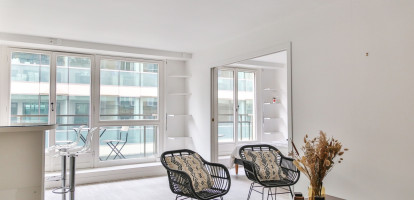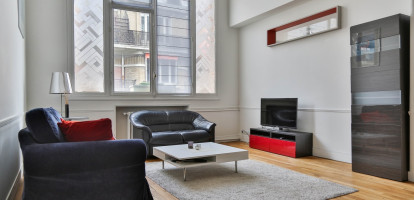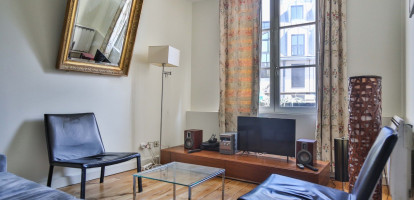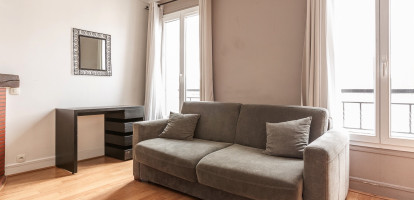So you've decided to get away from the American hustle and bustle for a new adventure in Paris - an excellent choice! But before you dive headfirst into croissants and cobblestone streets, there are some essential things you need to do as soon as you arrive in France. This guide will help you break down the key steps you need to take when relocating to France from the States.
1. Be prepared for the French paperwork
As soon as you arrive in France, get into the habit of taking care of your paperwork. Save your utility bills, bank statements, and rent receipts as if they were bills of gold. Why should you? You'll need them to prove you're a resident in good faith when you need to open a bank account, rent an apartment, apply for your long-term residence permit, or get a mortgage for your future real estate investment in France. When you apply for your Carte Vitale (French health insurance card), you must prove that you've been living the French vibe for at least the last three months.
2. Rent an apartment in Paris: Finding a home base
First things first, you'll need a roof over your head and to rent a furnished apartment in Paris.
The key steps to rent a long-term apartment in Paris as an American expatriate:
- Work with a local rental agency in Paris specializing in servicing expats, like PARIS RENTAL, or search online platforms like Seloger, Jinka, Facebook Marketplace, and Leboncoin.
- Before finding a place that suits you, prepare your rental file! Check the complete list of rental documents for renting an apartment in France here.
- When you're ready to sign the lease, be prepared to pay a first-month rent and a security deposit. Usually, the security deposit in France equals two months' rent for a furnished rental.
- Last but not least, make sure you understand the lease terms like a pro!
For smoother apartment rental hunting in Paris, we recommend that fellow US expats work with an English-speaking, expat-specialized Rental Agency in Paris, such as Paris Rental. Navigating the Paris rental scene can be challenging, and having experts who speak the language, offer a translated lease, and know the ins and outs is like having a secret weapon. It's the shortcut you need for a hassle-free apartment search in Paris.
3.Have your French long-stay visa (VLS-TS) validated within 3 months of arrival in France
How long can I live in Paris as an American? American citizens can stay in France without a visa for the first 90 days of their stay. Afterward, unless you hold an EU passport, the starting point for your stay in France is to obtain a long-stay visa. The go-to is usually a 1-year Long-Stay Visa Equivalent to a Residence Permit, aka VLS-TS. Once you enter France, with this French long-stay visa, it's not just a fancy stamp – it's your golden ticket to being a legal resident for the first year until you can enter the application process for your Carte de Sejour or Residency Permit.
But here's the kicker: you've got to validate your long-stay Visa within three months of touching down in France. How do you validate your long-stay visa upon your arrival in France? Don't worry; the process is simple, and you can do it online for 50 euros. Also, the website is available in French, English, and even Chinese.
Information required for online validation of long-stay visa in France
- A valid email address,
- Your visa details: visa number, start and end dates of validity, date of issue, and the purpose of your stay,
- Your date of arrival in France,
- Your residential address in France,
- A payment card to pay the tourist tax online.
Steps to validate your long-stay visa upon your arrival in France online:
- Head over to the website https://administration-etrangers-en-france.interieur.gouv.fr and log in.
- Enter your visa details, including the visa number, start and end dates of validity, date of issue, and the purpose of your stay.
- Provide additional information such as family circumstances, contact number, and email address.
- Specify your arrival date in France and your address within the country.
- Settle the stay tax of 50 euros to seal the deal.
- Congratulations! Your visa is now officially validated.
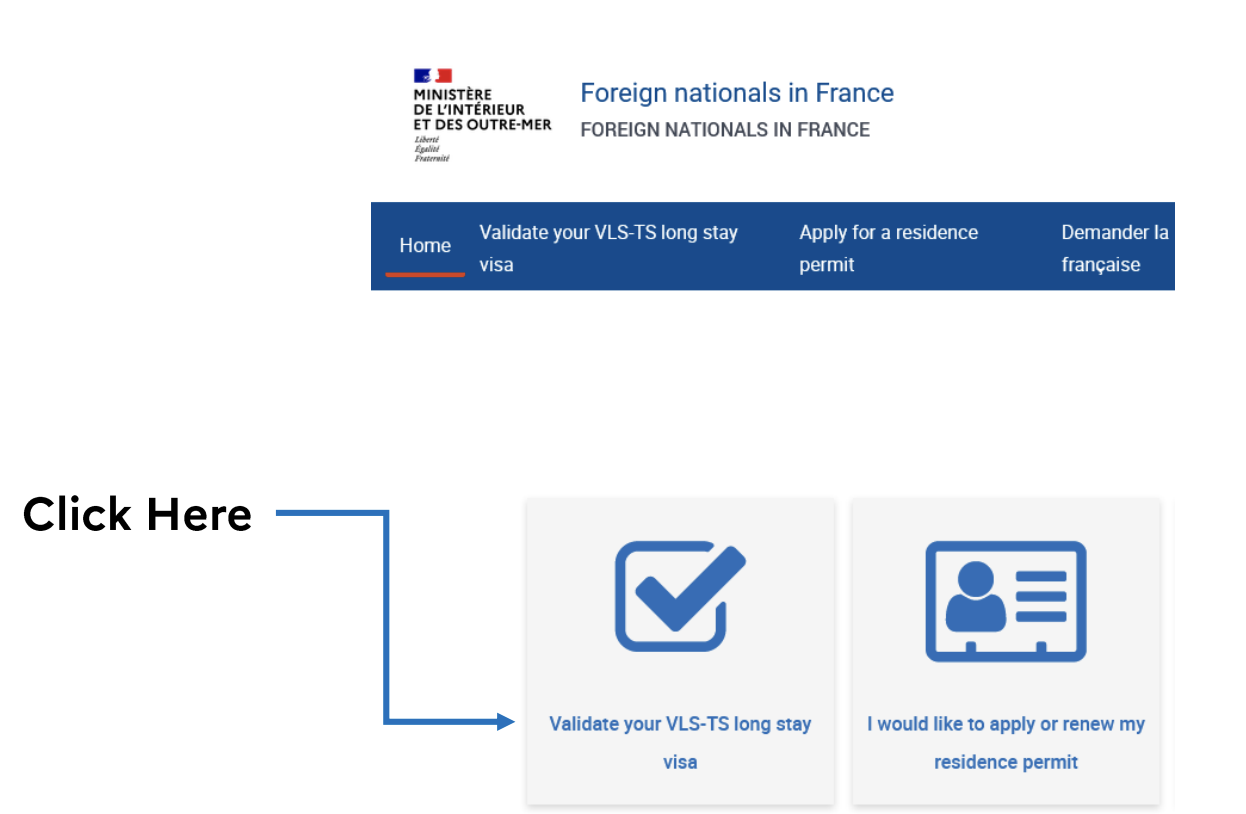
After completing the process of French Visa validation, you'll receive two emails:
a. The first email will include your login credentials for future account access. It will also confirm the validation of your VLS-TS visa.
b. The second email will reconfirm the details you entered online. This email serves as a downloadable confirmation of the validation of your VLS-TS visa.
4. Open a French bank account as expat
It's time to switch from dollars to euros. Opening a local French bank account will make your life in Paris much more effortless. From paying the utility bills to handling everyday transactions and keeping your finances in check, having that local account makes life much easier. Moreover, you can do all operations from your mobile phone using the bank's app.
Step-by-step guide to opening a bank account in France:
1. Choose a bank that suits your needs
2. Gather required documents for opening a bank account in France
List of documents required to open a French bank account:
- Valid passport
- Proof of residence in France (utility bill, rental agreement, housing insurance certificate)
- Proof of income, employment contract, or enrollment letter if you are a student
3. Make an appointment online, on the phone or over the counter
4. Attend the appointment to open a bank account
5. Complete the application form
6. Provide proof of address
7. Receive your bank card, pin code, bank application password, and details by post
Once your application has been approved, the bank will give you your RIB (bank account details) during the appointment, allowing you to make or receive wire transfers immediately. In addition, within a few days, you will receive your bank card, PIN code, password for the online/mobile telebanking application, and other relevant information.
8. Set up an online banking application
9. Activate your bank card before first use.
Last but not least, give your American bank a heads-up about your French adventure and figure out how you'll shuffle money between the two.
5. Register for social security in France and get a French social security number
France has a top-notch healthcare system; you'll want to be covered. Check if you're eligible for French national health insurance. Nobody wants medical surprises.
Key steps to register for Social Security in France as an American citizen:
- Determine eligibility: First, you must have been residing in France for at least three months to be eligible.
- You must have a permanent address in France.
- Prepare the required documents, including a valid passport, a visa, proof of address (e.g., electricity bill), and your birth certificate with apostille.
- Go to your local Caisse Primaire d'Assurance Maladie (CPAM) to start the application procedure.
- Complete the registration form and submit your application.
- Wait for confirmation: Once you have submitted your application, you will receive confirmation of your social security registration. This confirmation may contain your social security number and details of your coverage. This social security number is essential for accessing France's health services, social benefits, and administrative procedures.
- Activate your Vitale card: You will also receive a Vitale card and a health insurance card. You must activate the Vitale card according to the instructions given to you. The Vitale card is used for healthcare reimbursement claims.
We recommend that you start the formalities as soon as possible after you arrive in France to ensure that you have access to the necessary services and benefits.
6. Purchase a complementary health insurance plan (Mutuelle) for full medical coverage
To ensure comprehensive health coverage, consider taking out supplementary health insurance, called "mutuelle" in France.
The French healthcare system, "La Sécurité Sociale" (Social Security), covers significant medical expenses. However, there are often remaining costs, such as copayments and non-covered services, which a mutuelle helps to reimburse.
A mutuelle is a private insurance policy that individuals can purchase to complement their Social Security coverage. It covers the gaps left by the public healthcare system, providing additional financial support for medical expenses. It includes coverage for dental care, vision care, alternative medicine, and other services that the national health insurance does not fully cover.
If you are employed in France or your spouse is employed in France, the good news is that French employers offer a "mutuelle" plan and pay a percentage of it as part of their employee benefits. The employee's family members can also benefit from this supplementary health insurance for a small additional subscription fee. Individuals can also purchase them independently.
7. Subscribe to a French mobile phone plan
Having a French SIM card is becoming essential. Many business and administrative processes in France require a local French telephone number for verification and communication purposes. When dealing with local businesses, government offices, or setting up services such as utilities or a bank account, it is often required to indicate your French phone number.
Moreover, relying solely on an American telephone number may not be well received in certain situations. Local contacts, businesses, and services may prefer or insist only on a French phone number.
Besides, in France, mobile networks operate on GSM (Global System for Mobile Communications), which means that certain North American phones may not be compatible. Therefore, we highly recommend you get a French mobile plan even if you have excellent international cell phone service from the States.
Check out our guide to choosing the best telephone service provider in France.
8. Learn the French language: Parlez-vous français?
While plenty of folks in France speak English, speaking the local dialect will open up a world of possibilities. Sign up for French language classes, hit the apps, and chat with the local French people. It's the secret sauce for fitting in.
9. Dive into the French culture
French culture is more than just baguettes and berets! Attend local events, join community shindigs, and mingle with your neighbors. The more you soak it in, the richer your Parisian experience will be.

10. Sign up for utility services in France: Electricity, Gaz, Internet
Once you've settled into your new home, it's time to set up essential utility services such as electricity, gas, and internet. Start by contacting the relevant service providers to initiate the subscription procedure. Be prepared to provide information such as your address, email, French phone number, and, in some cases, a French bank account for automated payments. Although the language barrier can be problematic, many utility companies in Paris have English-speaking customer service representatives to help expats, such as the EDF (one of the biggest electricity suppliers in France) English helpline at 09 69 36 63 83 or +339 69 36 63 83.
However, subscribing to utility services in Paris as an American expat can be a breeze when working with a specialized rental agency. Agencies like PARIS RENTAL often assist expat clients in managing essential rental services, such as Internet and electricity subscriptions. Instead of navigating the intricacies of setting up utilities in a foreign country, a specialized rental agency can streamline the process, ensuring your transition to Parisian life is as smooth as possible without potential language barriers and administrative complexities.
11. File your tax return in France
Taxes are inevitable. When you officially settle in France, you automatically become a taxpayer, which means you must file a tax return and eventually pay taxes in France. All French residents are legally obliged to file a tax return each year, whether or not they are liable for tax. These returns are filed annually, usually in May or June, depending on where you live. If you own a property in France, you must file a compulsory property declaration, providing information about the property and its occupancy, whether it's vacant, you live in it or you rent it out.
And remember to send a message to the tax authorities in your home country about your move. Depending on your situation, revenues, and place of origin, you may have to file tax returns in France and the US. So, ensure you're fully aware of the legal implications.
Chat with tax pros if you need guidance—it's better to be safe than sorry.
12. Make Friends, Not Tourists
Building a social circle is vital to making France feel like home. Check out local expat events, social clubs, and networks. Before you know it, you'll have a crew to share baguettes and brie with.

Trading the American Dream for a taste of life in Paris is a bold move and will be a rollercoaster. But by ticking off these must-dos, you'll be well on your way to a smooth transition. Dive into the quirks, savor the differences, and enjoy the ride of living in this vibrant and culturally rich country. Bon voyage!
Editor: Siyi Chen
Photo credit @ Unsplash+
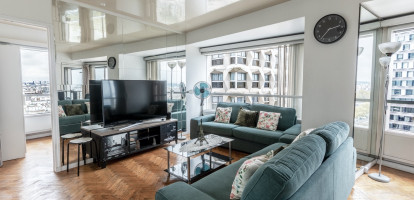


 Français
Français




